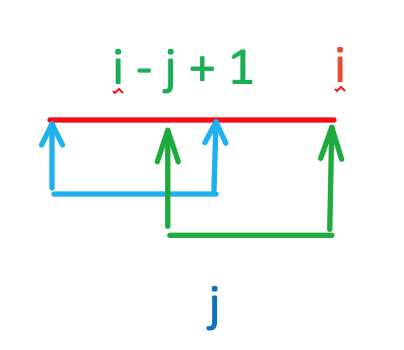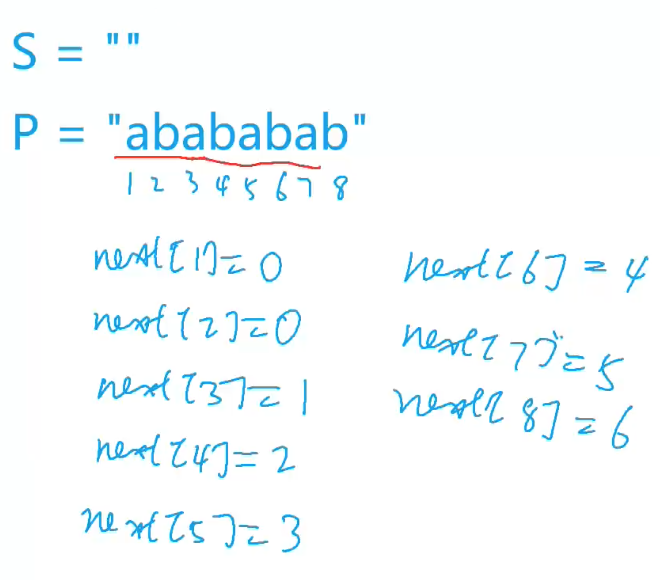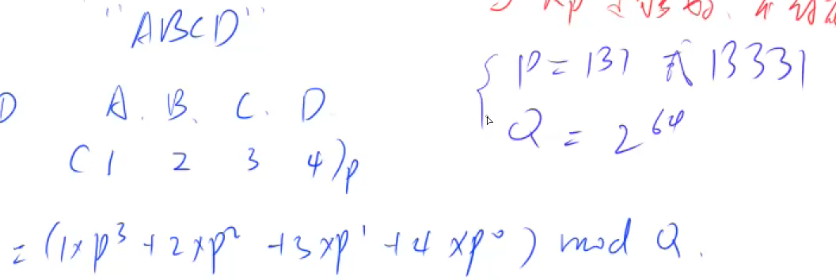String Match¶
Problem¶
Determine if a small string is a substring of another large string.
Return the index of the first occurrence of the small string in the large string.
Return -1 if the small string is not a substring of the large string.
Consider the case:
mississippi issip -> return 4
KMP¶
next array physcial meaning¶

next[i] = j means p[1, j] = p[i - j + 1, i] (blue part is same with grean part)
What it does is keep checking the longest suffix (ending at j) with prefix (starting at 0)
Or: longest ending index j that makes 0 ~ j == i - j + 1 ~ i
e.g. P = "ababababab"

psuedocode¶
Part 1: form the next array¶
- check if small[i] == small[j + 1]
- if not, meaning 0 ~ i - 1 matches 0 ~ j but i doesn't match j + 1
- to find last match (0 ~ i matches i - j + 1 ~ j + 1)
- if yes, meaning 0 ~ i matches 0 ~ j + 1, so keep matching and update j
- set next[i] = j // last match
Part 2: find in the original string¶
- check if large[i] == small[j + 1]
- if not, meaning large[0 ~ i] matches small[0 ~ j] but i doesn't match j + 1 (same as part 1)
- try last match
- if yes, meaning 0 ~ i matches 0 ~ j + 1, so keep matching and update j
- check if reach the end
Code¶
class Solution {
public:
int strstr(string large, string small) {
if (small == "") return 0;
int m = large.size(), n = small.size();
vector<int> next(n, -1);
for (int i = 1, j = -1; i < n; ++i) {
// either not start matching yet
// or find previous one that stops at current i
while (j >= 0 && small[j + 1] != small[i]) j = next[j];
// check if current one is matched
if (small[j + 1] == small[i]) j++;
// now
next[i] = j;
}
for (int i = 0, j = -1; i < m; ++i) {
while (j != -1 && large[i] != small[j + 1]) j = next[j];
if (large[i] == small[j + 1]) j ++;
if (j == n - 1) return i - j;
}
return -1;
}
};
String Hashing or RabinKarp Algorithm¶
- First calculate the hash value for subtring from 0 ~ i in large
- Second calculate the hash value for substring from i ~ j given hash values of 0 ~ i and 0 ~ j
To Prevent collision, use a large prime for P.

- Why use
unsigned long long? Becauseunsigned long long's max is 2^{64}, if add one more, it will become 0, which makes sure all the values are in the range of 0 ~ 2^{64} -- works like a module operation. - Why
h[i - 1] * p[n]? Because to find out the hash value for substring of i + n - 1 (right) to i - 1 (left), we need to find p[i + n - 1 (right) - i + 1 (left)], which yields p[n].
Code¶
before Optimization
class Solution {
public:
int strstr(string large, string small) {
if (small == "") return 0;
int m = large.size(), n = small.size();
typedef unsigned long long ULL;
int P = 131;
vector<ULL> p(m + 1, 1), h(m + 1, 1);
for (int i = 1; i <= m; ++i) {
h[i] = h[i - 1] * P + large[i - 1];
p[i] = p[i - 1] * P;
}
ULL check = 1;
for (int i = 1; i <= n; ++i) {
check = check * P + small[i - 1];
}
check = check - p[n];
for (int i = 1; i <= m - n + 1; ++i) {
ULL hash = h[i + n - 1] - h[i - 1] * p[n];
if (h[i + n - 1] - h[i - 1] * p[n] == check)
return i - 1;
}
return -1;
}
};
after optimization
class Solution {
public:
int strstr(string large, string small) {
if (small == "") return 0;
int m = large.size(), n = small.size();
typedef unsigned long long ULL;
int P = 131;
vector<ULL> h(m + 1, 1);
ULL p = 1, check = 1;
for (int i = 1; i <= m; ++i) {
h[i] = h[i - 1] * P + large[i - 1];
if (i <= n) {
p *= P;
check = check * P + small[i - 1];
}
}
check = check - p;
for (int i = 1; i <= m - n + 1; ++i) {
if (h[i + n - 1] - h[i - 1] * p == check)
return i - 1;
}
return -1;
}
};
Last update:
January 9, 2021